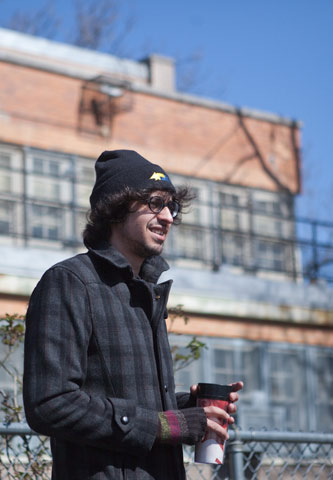They Come in PEACE
May 21, 2012

Ben Wasserman at the East New York Family Academy.
On a breezy spring morning, four Brooklyn College students huddle inside a tomato-red trailer on a gated campus at the corner of Linden Boulevard and Van Siclen Avenue. Soon, roughly 15 high school students will file into this makeshift classroom, and Jumana Morciglio, a senior majoring in philosophy and the designated lead on today's lesson, is going over the game plan for the philosophy course they are co-teaching at East New York Family Academy.
After a brief discussion parsing the difference between happiness and pleasure, the high school students will cut out images from magazines of things that make them happy and put them into a box.
"The point is to get the kids to realize that their happiness is dynamic and in their control, therefore they can learn how to control what they value," Morciglio explains, noting that she will be kicking off the lesson with quotes from Aristotle and John Stuart Mill.
While today's assignment involves the students cutting out pictures, one would think it's the Brooklyn College student-teachers who have their work cut out for them, trying to impart ethereal lessons from long-dead sophists to a group of kids whose realities are often presumptively pretty pragmatic.
But the East New York Family Academy is a school where the infamously hard-knock streets haven't dampened the students' aspirations, one where the 84 percent of students who qualify for free or reduced lunch are bested by the 90 percent who graduate. And where, on this day, the students are all wearing hooded sweatshirts in solidarity with the movement of people across the country who are outraged over the shooting of an unarmed teenager in Florida. There are teachable moments.
Ben Wasserman always knew there would be. The 2012 graduate and philosophy major first started dreaming up the program — called the PEACE Project, for Philosophy, Ethics And Community Education — when he was working at a Jewish community center integrating some philosophy into the youth-development programs.
He knew he could spread his own passion and make philosophy more accessible to the masses. "I just really wanted to bring it down a little, make it less of this ivory tower esoteric, restrictive subject," he says.
He cemented his idea for the project after he attended a conference to participate in a panel discussion about his work. He was joined on the panel by three other philosophy undergraduates, all of whom were working with college-based outreach programs.
"They had a form of legitimacy that I didn't have," he says. "I was just some rogue guy at a community center questioning life."
But Wasserman, bearded with thick round-rimmed glasses and chin-length hair, oozes an enthusiasm and a can-do spirit that has served him well both in relating to the high school students and in getting the project off the ground.
He decided to pitch an idea for a program where he'd go into local public high schools or community centers with some fellow college students and teach philosophy. But at a time when science is the new sexy, he says he never thought he'd find supporters for some inscrutable humanities program with lofty goals of getting young people to think about things like their identity. Yet, he ended up convincing the Squire Family Foundation to give him $10,000 in seed money, and he persuaded professors in the college's philosophy and education programs to give PEACE a chance.
"Ben immediately comes across as someone very capable and very motivated," says Matthew Moore, chairman of the Department of Philosophy. "When I first heard about the program, I saw it as being an exciting opportunity and an intrinsically good thing."
After Moore and Deborah Shanley, dean of the School of Education, signed off on the proposal, they set up a faculty advisory board with three philosophy and three education professors to make sure that the student-designed curriculum was sound.
The School of Education already had a partnership with the East New York school and, after speaking with the principal, decided it would be the program's first site. (There are plans to expand the program to other schools.) Then Wasserman and some of the faculty advisers set about trying to recruit students to teach the course. The Department of Philosophy agreed to allow students to use the program for its internship requirement. Education students, who always need classroom experience, were a natural fit as well.
So Wasserman was able to recruit Morciglio and two students from the School of Education to teach the pilot course. On this day, Morciglio has planned and leads the discussion, but everyone chimes in. And if it seemed like the lesson was just coming together before class, when things get under way these Brooklyn College student-teachers flow like a well-disciplined team, lobbing questions at the high school students, taking turns throwing out new things to think about and always keeping their audience engaged.
When a student mentions that fast cars make him happy, Wasserman pushes back.
"What is it about the car?" he asks. "Is it the car? The adrenaline rush you get from driving fast?"
"I think it's the pursuit of happiness that makes you happy," says Dashawn Washington, a 12th grader.
"Right. If everything is given to you, would you really know what happiness is?" questions Leronne Kornegay, also a 12th grader. "I think you need the struggle to appreciate it."
Wasserman smiles. So does Morciglio.
"Aristotle would agree with you," she says.













